Off-season meetings of National Hockey League brass have been held since the league began operation in 1917. Today, the meetings are mainly focused on the annual drafting of players who are reaching the age of 18, the main process by which NHL clubs re-stock the player cupboard. Fans get so wrapped up in the draft that other hockey business items sometimes get lost in the shuffle. Over the years, the most important pieces of NHL business have been conducted at these meetings. The meetings have always been the scene of some good old-fashioned horse-trading, and over the next few days leading up to Friday’s draft we’ll discuss some of the more significant transactions that occurred around the annual NHL get-together.
Today, the NHL holds their major annual meeting in a different city each summer in June, after the completion of the Stanley Cup Playoffs. That wasn’t always the case. In the early days, all meetings were usually conducted in Toronto, and held at least twice a year – in May and September or October. While there wasn’t a lot of player trading in the early days, a number of men were bought and sold for cash. For the purposes of this exercise, we’ll only look at player-for-player (and later draft picks) transactions.
1933 – Leafs, Habs swap goalies
So, climbing into the way-back machine, we find a one of the first really significant player trades of these meetings took place on the first of October, 1933. The Toronto Maple Leafs and Montreal Canadiens made headlines by swapping star goalkeepers. Toronto sent Lorne Chabot, who for five years had been the regular Toronto twine-tender (as he was referred to in the Toronto Star report on the deal) to the Canadiens for their stalwart backstop George Hainsworth.
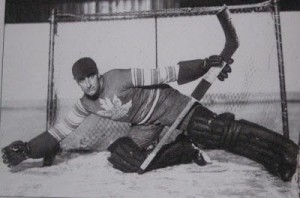
Toronto papers at first reported that the deal might not go through. Chabot didn’t want to leave Toronto and declared that he was retiring. The Maple Leafs didn’t believe the veteran goalie and went ahead with the deal, and Chabot reported to Montreal, as everyone anticipated he would.
Chabot started with Rangers
Chabot began his career with the New York Rangers and recorded a shutout in his NHL debut against the Detroit Red Wings in 1926. He was sent to Toronto for another goalie, John Ross Roach, in October of 1928. He became a star with the Maple Leafs. Chabot would spend just one season in Montreal before being included in what was up to that time considered the biggest trade in terms of star players.
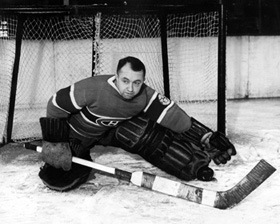
Hainsworth nearing end of the line
Hainsworth was, at the time, on the downside of a legendary career with Montreal. In seven seasons with Canadiens, he put up amazing numbers, including a season in 1928-29 that is possibly the best statistical performance by any goaltender in NHL history. During that season, Hainsworth played every one of Montreal’s 44 scheduled games, winning 22 times, while tying 15 games. What is truly incredible is that he recorded 22 shutouts in those 44 games. His goals-against average was 0.92. That mark of 22 whitewashes has and likely never will be equalled.
Hainsworth would play three full seasons with Toronto, becoming the first Leaf goalie to record 30 wins in a season. He was released three games into the 1936-37 season, whereupon he returned to Montreal to finish his Hall-of-Fame career.
1934 – Habs send Howie Morenz to Chicago
One year after that Toronto – Montreal deal, on October 3, 1934, the Montreal Canadiens sent the player who was generally regarded as the NHL’s greatest up to that time, Howie Morenz, to the Chicago Blackhawks in a six-player exchange. The deal rocked the hockey world as many were shocked to see Montreal’s greatest player sold to a stateside club.
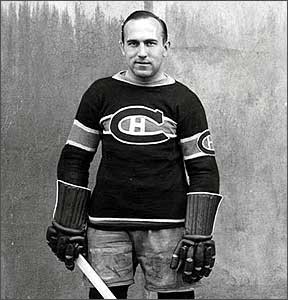
All the details of what actually was transpiring weren’t readily apparent. At first glance, it looked like Canadiens were sending Morenz, Marty Burke and goalie Chabot to the Blackhawks for Lionel Conacher, Roger Jenkins and Leroy Goldsworthy. It seemed as if Montreal was sending one of the greatest scorers of that era away for one of the best defencemen in Conacher. And make no mistake, these were two Canadian sporting icons. Morenz was a sure-fire Hall-of-Famer, while Conacher would be voted Canada’s best athlete of the first half of the twentieth century. But, it wasn’t that simple.
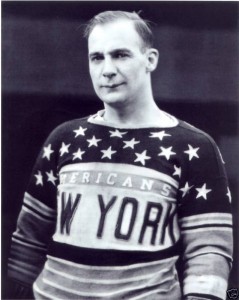
When news of the exchange first leaked out, word around the league was that Morenz’s role with Chicago was to be more than that of star player. Some felt that “The Stratford Streak” would become part-owner of the Chicago club, while others speculated that he was slated to assume the role of managing director. As it turned out, none of that happened. Morenz spent a season-and-a-half in Chicago before being unceremoniously sent on to the New York Rangers. He played only 19 games at the end of the 1935-36 season with New York before being sold back to Canadiens to start the 1936-37 campaign.
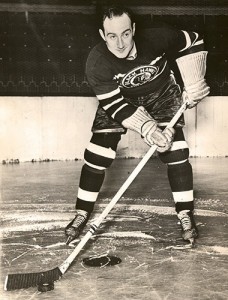
Morenz’s career came to an end that season, when he suffered a badly broken leg in late January. Only a few weeks later, after complications set in, Morenz passed away.
Dandurand wanted Crutchfield
On the Montreal side of the deal, Canadiens managing director Leo Dandurand had no intention of keeping Conacher. Dandurand had his eye on a young amateur who was owned by the rival Montreal Maroons. Nels Crutchfield was a standout player at the University of McGill in Montreal. His rights were owned by the Maroons, but Dandurand felt so strongly about his potential, he began talks with Montreal’s other NHL representative. The Maroons were not interested in the aging Morenz, but did tell Dandurand that if he could get Conacher, they might be able to work something out.
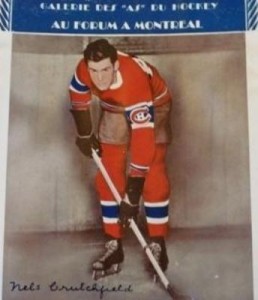
Once Dandurand had secured Conacher, he packaged him along with the rights to Herbie Cain to the Maroons for Crutchfield. This part of the deal had its own bit of intrigue. Cain had originally been signed by the Maroons from Hamilton of the OHA Senior A league during the previous season. Canadiens protested, claiming they owned Cain’s rights. The league stepped in and on the day of the trade awarded Cain’s rights to the Canadiens. Knowing the Maroons badly wanted this player, Dandurand immediately included him in the transaction for Crutchfield. At the end of the day, everybody was happy.
Destiny foiled Crutchfield’s chance at stardom
Dandurand felt that Crutchfield was destined to be a long-time star for the Habs. Unfortunately, there was to be no happy ending for Crutchfield.
After a rookie season in which the young centre scored 10 points in 41 games, he was involved in an automobile accident just before the start of the 1935-36 season. Crutchfield sustained a severe concussion and his playing career was over. He tried a comeback several years later in the amateur ranks but wasn’t able to continue.
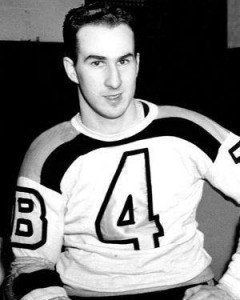
Cain, meanwhile, likely was the player who benefitted most from the trade. He became a solid NHL forward with the Maroons for four seasons. He was traded back to Montreal for one year, before they dispatched him to Boston in a trade. With the Bruins, Cain’s career took off, and he even led the league in scoring in 1943-44 with 82 points in 48 games. He retired from professional hockey in 1950.
Next time, we’ll have a look at some trades made at the summer meetings in the Six-Team Era. It was during that time that the league meetings began to assume the form we are more familiar with today.